- Home
- Daily Meditation
Neighbor’s Cow
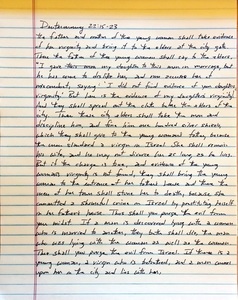
Deuteronomy 22:15-23
Synopsis Deuteronomy 22:15-23 3/5/2018
Moses addressed the situation of children who are born to an unloved wife – that their inheritance may not be discriminated against. He also established the law concerning a rebellious son and the law concerning the corpse of someone who has received capital punishment.
In a different vein, Moses described the responsibility that each member of the community has toward the property of neighbors. According to this law, each member of the community was required to catch any stray animals they encountered and return them to their owners. Moses extended this law to include all property.
Neighbor’s Cow
So the law of the Authentic Community is that I cannot look the other way. I cannot ignore my neighbor’s lost cow, or donkey, or sheep or material possession if it is in my power to restore it to my neighbor. I am bound by this law to act – to help. I am bound to round up the renegade and take it to its home.
Who is My Neighbor?
The self-righteous scribe couldn’t help himself. “And who is my neighbor?” he asked Jesus.
Of course, I am the self-righteous scribe. If someone dropped a quarter in the grocery I’d be the first to rush over to “help” pick it up. But I am simultaneously so sure I understand the letter of the law that I can always find a way to justify not investing time in my neighbor who has lost his spouse to cancer.
Recently someone said to me, “You make it all sound so easy – but it isn’t easy”. So my words betray this deeper reality. My own experience tells me this way of givenness is strangely not easy. And yet the work itself is not a burden. The challenge, it seems, is all inside of me.
It’s true. It’s authentic. It’s easy to say. But it’s the doing that matters.
“And who is my neighbor?” Luke 10:29
Save the Trees

Deuteronomy 20:15-21:4
Synopsis Deuteronomy 20:15-21:4 3/4/2018
Moses described the rules of war for cities that were actually in the geographic boundaries of the Promised Land. Also, he prohibited the destruction of fruit trees at besieged cities.
Save the Trees
Ancient war was a savage business with very few rules. So, it might seem like a kind of an oddity that in the ancient Mediterranean world, it was considered deeply immoral to destroy an enemies’ fruit trees.
The issue was the nature of fruit production. The land was productive through its trees. Just for the record, by fruit trees, we’re talking primarily about olive trees and vineyard grapes. To destroy these was an act of total war because of the time it would take decades to replace destroyed trees an vines. The only purpose of this kind of destruction is the determination to complete annihilation of an adversary.
For any community, a town’s orchards were considered key infrastructure. The oil from olives was used for everything from food, to hygiene, to light from torches and lamps. Grapes were used for wine, which was an essential beverage in a land with challenges for water purity.
So destroying fruit trees as part of a siege was understood as an attack on the earth’s capacity to produce for mankind, more than an appropriate part of hurting your enemy.
Care for the Earth
Laudato Si’ invokes the fraternal brotherhood of all created things as Francis of Assisi experienced them. With this, the Authentic Community is reminded that we bear responsibility to protect that which God has given to all in common. Our failures, like our successes, will always be more than the aggregation of our individual behaviors. What we do individually matters. Yet, there is a morality in community. A community can sin just as a community can do righteously.
It is up to the Authentic Community, a pilgrim people, to bear witness. The Father cares about every sparrow, and every tree.
“Are not two sparrows sold for a small coin? Yet not one of them falls to the ground without your Father’s knowledge.” Matt 10:29
Rules of War
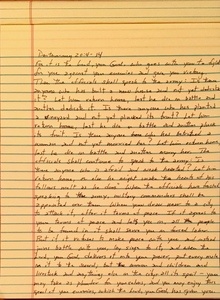
Deuteronomy 20:4-14
Synopsis Deuteronomy 20:4-14 3/3/2018
Moses gave specific instructions about the military preparations for war. He had discouraged the Israelites from having a king and a professional standing army. He also gave instructions concerning who should fight and who should be left behind.
Then, Moses delineated the rules of engagement with fortified cities. He further defined what spoils were authorized for the soldiers and the community in the case of victory.
Rules of War
- A soldier with unfinished business is not free. The anticipation of battle forces a person to think about the inevitability of dying. For someone with lots of unfinished business, the prospect of dying in battle fills the heart with fear, regret, sadness and even grief. The soldier who is ready for battle is detached from unfinished business. His house is in order.
- It is easier to take a city with an offer of compassion. Total war bolsters defenses. Leading with a compassionate offer melts resistance.
Love Your Enemy
In Jesus, there is a coming together of these two seemingly different rules:
Jesus was free. He was detached from unfinished business. He did not have property or material investments. He did not have personal projects that kept Him from engaging. He was not distracted. He could not be distracted. He was free from worry or regret.
Similarly, he was filled with compassion. As Creator, he wanted nothing more than to relate to His creation. Even now, He seems to want to experience the value of what He has done. His defenses are not up. He is approachable. And, even though He is an irresistible force, He extends the olive branch first, wherever he goes.
Detachment and Compassion: Key ingredients in the Way of Givenness.
“But I say to you, love your enemies, and pray for those who persecute you” Matt 5:44
The False Witness
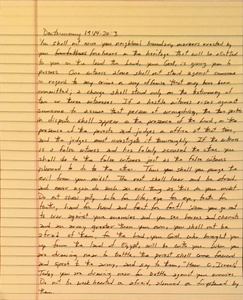
Deuteronomy 19:14-20:3
Synopsis Deuteronomy 19:14-20:3 3/2/2018
Moses taught the people to not cheat and to not pervert the truth. He forbade them from moving ancient boundary markers. He also made a legal rule where a person could not be convicted on the basis of a single witness. Finally, in order to preserve the integrity of the process, he made the giving of false testimony a crime that was punished by giving the same punishment to the witness that would have been given to the accused if found guilty.
The False Witness
The ideal witness is one who has no self-interest. The ancients recognized that self-interest makes dubious testimony. And this isn’t merely an issue of maliciousness. Ancient wisdom recognized what modern science has proven: human beings interpret circumstances differently over time. Our true motives are often hidden from our conscious thought. This isn’t a choice, but a limitation of our brain’s capacity.
This is why, in the law of Moses, bearing witness was fraught with a downside. If a witness was found to be untruthful, that person was subject to judgement and punishment. The intent of the law is that a witness avoid offering any testimony that wasn’t absolutely certain.
Pure Speech
Two or three scrutinized witnesses make a claim true. This isn’t simply a juridical protection against a malicious person who wants to pervert justice for personal gain.
Yet if this God-given standard were the way of our ordinary speech, there would be no fraud, no calumny, no gossip, and no slander.
If the motive for my speech was the truth, my words would be few and lifegiving.
Lord, set a guard over my mouth. Keep a watchman over my lips.
“If I testify on my own behalf, my testimony cannot be verified.” John 5:35
Homicide Refuge
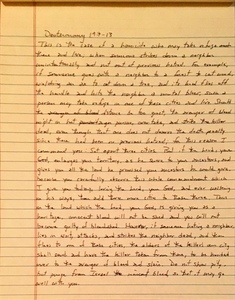
Deuteronomy 19:4-13
Synopsis Deuteronomy 19:4-13 3/1/2018
Moses reiterated the law concerning inadvertent homicide. A person whose actions cause the death of another person but without malice can escape the “life for life” provision of the law. In order to do so, the killer must flee to a designated city of refuge. In this place, the avenger of blood cannot exact vengeance.
Moses also anticipated that more cities of refuge should eventually be added. As Israel grew in size it was important to preserve this element of both justice and mercy. This provision should not be diluted simply by the length of the distance from the nearest city of refuge.
Jesus as a City of Refuge
I am a refugee.
Jesus died at the hands of human beings. Men and women; people who are just like me. They killed Jesus thinking they were justified. They thought they were right to kill Him.
And Jesus allowed all of this. He accepted their misunderstanding. He accepted their hatred. He accepted their cruelty. And He forgave.
When the people of Jerusalem killed Jesus, they didn’t do it alone. They acted out the core emotion of every man and woman who have ever been separated from the God of creation. They rejected the moral claims of the one, true God.
Like Adam and Eve, they were deceived. They acted out of their fear. They acted out of their mistrust.
And Jesus was dead. He was left hanging on a tree.
They were glad – Glad to be free from the claims of the God of creation. Glad to return to the God they had put in a box, in a temple, in a sacred city. The God who had been tamed.
And I was glad too. Because we all want God in a box, in some far away temple, in some sacred city. Somewhere that doesn’t affect my life too much.
It was a murder in utter ignorance. We called it self-defense. He seemed to attack our very being – everything we once believed was valuable and important.
Hard to believe we could so often be so blind.
Yet even in this – there is a city of refuge. Jesus is the city of refuge. I am a refugee.
“and which none of the rulers of this age knew; for if they had known it, they would not have crucified the Lord of glory.” 1 Cor 2:8
A Prophet Like Me
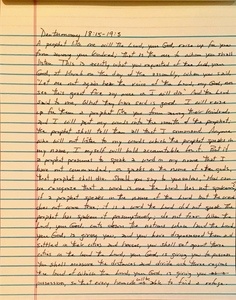
Deuteronomy 18:15-19:3
Synopsis Deuteronomy 18:15-19:4 2/28/2018
Moses described to the Israelites how God would raise up additional prophets as the community required them. He gave them a process by which they could discern whether a person was actually a prophet of God.
A Prophet Like Me
On the one hand, Moses anticipated that God would raise up prophets to inform the community. He told the people how they would be able to recognize an authentic prophet from a false prophet. There is the sense that this would be an ongoing process from generation to generation.
On the other hand, it seems like Moses was anticipating a particular kind of prophet – someone who was like him. This person would be a mighty worker of miracles and someone who had direct experience with God.
Moses understood the need for such prophets was the awesomeness of experiencing God directly. God was so awesome that none of the Israelites could imagine being in His presence and surviving. The raw glory of God is this overwhelming – that powerful.
Jesus Like Me
Jesus is God incarnate.Fully human. Fully flesh and blood. Fully Divine. Fully God. His claim is outlandish. He promised that if you love Him and keep His word, then the Father will love you, and they will both come to you and make their dwelling with you. (John 14:23 para) The terrible, awesome fear that the ancient Israelites felt has been overcome by love.
Because:
“There is no fear in love, but perfect love drives out fear because fear has to do with punishment, and so one who fears is not yet perfect in love.” 1John 4:18
Priests, Prophets and Diviners
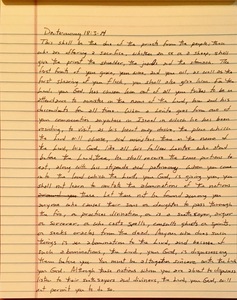
Deuteronomy 18:3-14
Synopsis Deuteronomy 18:3-14 2/27/2018
Moses reiterated the portions of the sacrifices were due to the priests and Levites. He also made clear that a Levite, no matter where he lived in Israel, could attend to the tabernacle and serve there as he desired. For the Levite visiting the tabernacle, he had the full right to eat of the sacrifices.
Moses also warned the people not to practice divination. In doing so, he made a distinction between the role of a prophet and the work of sorcerers and diviners.
Priests, Prophets and Diviners
Priests and prophets were instituted to mediate between God and men. The children of Israel were terrorized at the prospect of dealing directly with the God of all creation. His appearance in smoke and fire, thunder and lightning, showed the power of God. Not everyone was open to a direct encounter with God especially as they began their personal, spiritual journey. Hence, priests and prophets.
But divination is motivated by a different ambition. This is the drive is to gain power aside from God. It comes in lots of forms: the desire for esoteric knowledge, the search for secret principles over the forces of nature, the ability to interact and manipulate in the occultist realm. There is, of course, no power against God. Yet the ambition to circumvent God in order to get power is a denial of everything God is. Those who practice this way of thinking are deeply deceived.
Truth, beauty and goodness. The right ambition is to find value through the ordinary circumstances of life – from what’s actually given.
There isn’t any knowledge that God won’t share – if I listen.
The face of the wicked hardens, but the upright maintains a straight course. No wisdom, no understanding, no counsel prevail against the LORD. Prov 21:29-30
The King
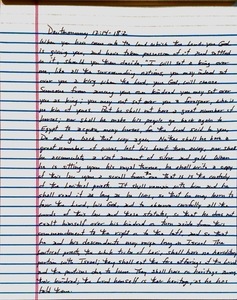
Deuteronomy 17:14-18:2
Synopsis Deuteronomy 17:14-18:2 2/26/2018
Although the idea wasn’t promoted, Moses authorized the people to make a king. There were stipulations. The king could only be from amongst the tribes. He had to be a kinsmen. The king should not have a great number of wives, horses or horde extraordinary wealth.
The king had to be knowledgeable about the law Moses had taught. He was required to write out his own personal copy of the law. This was to be his required daily reading, as long as he was on the throne.
The King
Becoming a kingdom was a tricky business for the ancient Israelites. Though it wasn’t obvious, the desire to be “like the nations around them”, made a distinction between the Authentic Community and the social contract communities.
The nations were social contracts run by rulers. The Israelites were a chosen people, a royal priesthood. They were a covenant community whose existence mediated between God and all humanity. Could the nation-state of Israel be anything like the Authentic Community Israel was intended to be?
The Kingship of Jesus
Curiously, the only possible reconciliation of this challenge is if God becomes the head of the community – the king.
But God’s not trying for an earthly theocracy. It was never the goal. Even if this weren’t evident from scripture, it would be from the tragic fails in the church’s collective political history.
He said, “My kingdom does not belong to this world.” His goal is an Authentic Community. Whatever else it may be, it is transcendent. It is true. And it’s citizen-subjects know who they are and who rules over them.
“So Pilate said to him, “Then you are a king?” Jesus answered, “You say I am a king. For this I was born and for this I came into the world, to testify to the truth.” John 18:37
Truth and Action
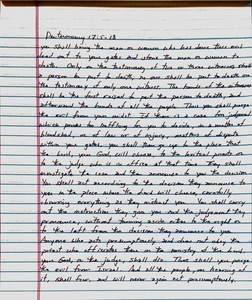
Deuteronomy 17:5-13
Synopsis Deuteronomy 17:5-13 2/25/2018
Concerning the administration of law, Moses commanded that the death penalty required two or three witnesses. This was a minimum requirement. Also, the witnesses who testified in a capital case were required to be the first to impose any penalty.
Additionally, Moses provided a process for appealing cases to a more competent authority if a local judge could not make a determination. Either the Levitical priests or the judge in office would serve the people at the tabernacle. Whoever heard the case was responsible to make their own investigation – not merely rule on the facts already established. They would announce their decision which was final and binding.
Justice and Responsibility
Under the law of Moses, witnesses were required to participate in the execution of justice. It’s a different sort of business than our modern approach.
The process was ordered: Establish the truth of the circumstances. The baffling of a local judge was not the end of the process. The community had to go to a higher judge to establish the truth.But once a truth was established, everyone within the community was required to respond. Responding to the disvalue (or value) created by the situation was an imperative. It’s a curious mandate. Each person needed to engage with the truth. Not responding to the truth was not an option. As a result, truth was never an academic pursuit.
Truth, it seems, comes packaged with a moral requirement to respond.
Truth and Action
So, truth requires a response – an action. This is a non-option. Whether the circumstances are a matter of criminal misconduct or me simply living out my day-to-day experience, the God of all creation says, “Act”.
“Children, let us love not in word or speech but in deed and truth.” 1John 3:18
Appropriate Worship
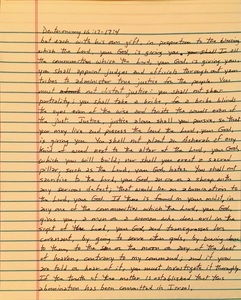
Deuteronomy 16:17-17:4
Synopsis Deuteronomy 16:17-17:4 2/24/2018
Moses directed the Israelites to assign judges for their communities. The judges were to administer justice. These judges were to pursue justice alone and were specifically warned against taking bribes or otherwise perverting justice.
Moses warned the people about keeping their sacrifices pure. They were to never sacrifice a defective animal. They were never to erect or worship Asherah poles or other symbols of idolatry.
Appropriate Worship
It is not fitting that the things of heavens should bow down to the things of the earth.
Made in the image of God, when I bow down to created things, I invert the true order of value. It’s like I’m trying to force the Creator to bow down to the creation. It’s an injustice. It’s a denial of the truth.
If I force the issue, the effort is likely to produce some sparks.
“God is Spirit, and those who worship him must worship in Spirit and truth.” John 4:24









